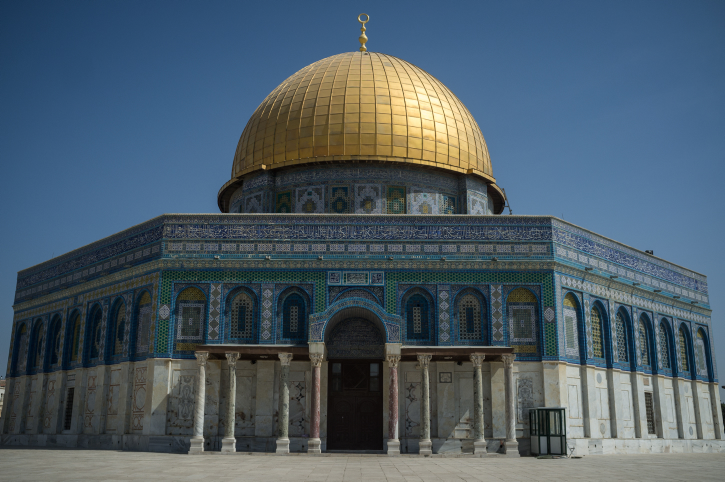Controversial Proposal Emerges as Israeli MP Suggests Division of Al-Aqsa Mosque

In a recent interview with Hebrew-language newspaper Zeman Israel, Amit Halevi, a member of Israel’s ruling Likud party, has put forward a proposal to divide the Al-Aqsa Mosque, a move that has raised significant concerns among Palestinians. The suggestion of splitting the holy site between Jews and Muslims has triggered alarm, as Palestinians have long-held apprehensions about any potential division of the revered mosque.
Under Halevi’s plan, he advocates for allocating approximately 30 percent of the southern section of the complex for Muslim worshipers, while the remaining portion would be designated for Jews, encompassing the area where the iconic Dome of the Rock is situated. This proposition has reignited tensions and amplified fears surrounding the future of the Al-Aqsa Mosque, a place of immense religious significance for both Muslims and Jews.
Covering an expansive area of 14 hectares, the Al-Aqsa Mosque holds immense religious significance as an Islamic site, featuring notable structures such as the Dome of the Rock and the silver-domed al-Qibli prayer hall. Decades-long international agreements have strictly prohibited unsolicited visits, prayers, and rituals by non-Muslims within the premises of the mosque.
Revered by Jews as the Temple Mount, the hill on which the mosque stands is believed to be the historical location of two ancient Jewish temples. The coexistence of these religious narratives adds to the complex dynamics surrounding the site.
The proposal to divide the Al-Aqsa Mosque comes at a time when right-wing settlers have been increasingly encroaching upon Israeli territories. These actions, along with recurrent violations of existing agreements by Israeli occupation forces regarding the usage of the site, have fueled tensions and raised concerns about the preservation of the mosque’s sanctity and international commitments.
Since the occupation of East Jerusalem, including the Old City housing the Al-Aqsa Mosque, by Israel in 1967, there has been a persistent drive from Israeli ultra-nationalist factions to establish “full sovereignty” over the sacred site. This has raised apprehensions among Palestinians and the wider Islamic community, who fear that the distinct Palestinian and Islamic character of the site might be compromised.
The Israeli government’s control over East Jerusalem violates multiple principles enshrined in international law. According to these legal principles, an occupying power holds no rightful sovereignty over the territory it occupies and is prohibited from making any permanent alterations to the area. These violations have fueled ongoing debates and concerns regarding the legal status and future of East Jerusalem, particularly in relation to the preservation of the Al-Aqsa Mosque and its religious significance.
The proposed plan has faced resolute rejection from Palestinians, who express grave concerns that it could ignite a religious war in the region. The Higher Presidential Committee of Church Affairs in Palestine has issued a statement emphasizing the need to halt and confront the plan.
Palestinians have harbored longstanding fears that the groundwork is being laid for the division of the Al-Aqsa Mosque between Jews and Muslims, similar to the partitioning of the Ibrahimi Mosque in Hebron during the 1990s.
They point to a recent surge in Israeli ultra-nationalists visiting and praying at the Al-Aqsa Mosque under the protection of police, without permission from Palestinians. This trend has caused alarm, as it represents an increase in unauthorized incursions. In 2009, approximately 5,658 settlers entered the mosque through such means, while in 2019, just before the Covid-19 pandemic, the estimated number soared to 30,000.
The escalating numbers and unauthorized access have reinforced Palestinian concerns and intensified their opposition to any plan that could undermine the integrity of the Al-Aqsa Mosque, exacerbating tensions in the region.
During his interview, Halevi proposed the withdrawal of Jordan’s administration of Al-Aqsa.
For many years, the Hashemite royal family of Jordan has held the responsibility of safeguarding the Muslim and Christian sacred locations in Jerusalem, including Al-Aqsa. This arrangement, referred to as the “status quo,” has been carefully maintained on an international level.
Halevi remarked that the act of praying in that location does not automatically render the entire Temple Mount as a sacred place for Muslims. He used the term Temple Mount, which is commonly associated with Al-Aqsa, from a Jewish perspective to make his point.
“We will claim the northern section and conduct prayers there. The entire mountain holds sacred significance for us, and the Dome of the Rock represents the site where the Temple once stood. This principle should serve as our guiding principle. Israel is taking the lead, making a profound statement that encompasses history, religion, and our national identity,” Halevi emphasized.
Halevi also aims to modify the protocols for Jewish visitors accessing Al-Aqsa, insisting that Jews should be permitted to enter through all entrances instead of solely through the southwestern Moroccan Gate.
Out of the 15 entry points to the mosque, the Moroccan Gate, also known as Bab al-Magharba, remains the only gate under the complete control of Israeli authorities, inaccessible to Palestinians.
In September of last year, Israeli ultra-nationalists forcibly entered Al-Aqsa through the Lions’ Gate (Bab al-Asbat), marking the first instance of such entry from that gate since the Israeli occupation of East Jerusalem.
Numerous Palestinians express concern that granting settlers access through various gates implies an expansion of Israeli authority over the mosque and a potential alteration of the existing arrangement.
No comments:
Post a Comment